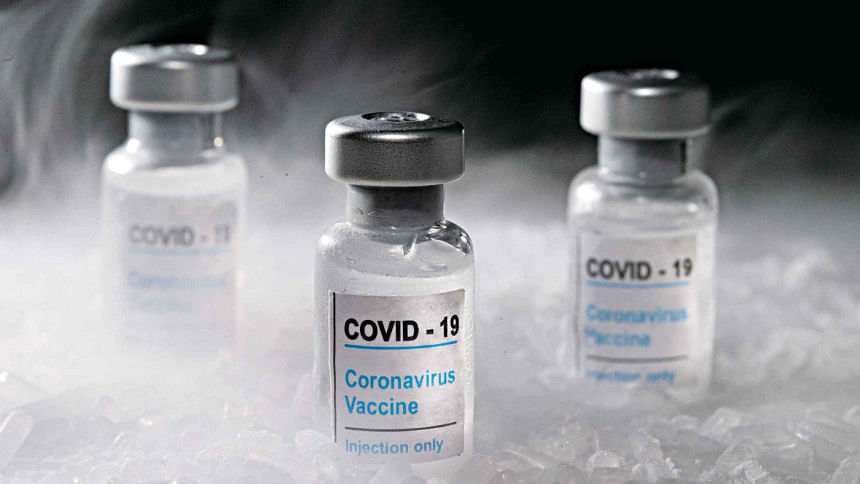Britain first to approve Oxford vaccine

Britain yesterday became the first country in the world to approve a coronavirus vaccine developed by Oxford University and AstraZeneca, hoping that rapid action would help it stem a surge of infections driven by a highly contagious variant of the virus.
Boris Johnson's government, which has already ordered 100 million doses of the vaccine, said it had accepted a recommendation from the Medicines and Healthcare products Regulatory Agency (MHRA) to grant emergency authorisation.
The approval is a vindication for a shot seen as essential for mass immunisations in the developing world as well as in Britain, but does not eliminate questions about trial data that make it unlikely to be approved so rapidly in the European Union or the United States.
"The NHS (National Health Service) will be able to deliver these shots into people's arms at the speed at which it can be manufactured," Health Secretary Matt Hancock told Sky News.
"I am also now, with this approval this morning, highly confident that we can get enough vulnerable people vaccinated by the spring that we can now see our route out of this pandemic."
Johnson called the approval a "triumph for British science".
Hancock said hundreds of thousands of doses would be available to administer next week in Britain, which is already rolling out a vaccine developed by Pfizer of the United States and BioNTech of Germany.
The Oxford vaccine has been found in trials to be less effective than the Pfizer/BioNTech shot but, crucially for countries with more basic health infrastructure, can be stored and transported under normal refrigeration, rather than supercooled to -70 degrees Celsius (-94 Fahrenheit).
INDIA INTERESTED
India is keen to start administering the new shot next month; Serum Institute of India (SII), the world's biggest producer of vaccines, has already made about 50 million doses. Chile is also interested.
SII has already applied for regulatory approval with the Drug Controller General of India.
SII chief executive Adar Poonawalla had earlier said the vaccine candidate could get approval by next week in India and might be rolled out for the masses in January. "The company is ramping up capacity every week," he said.
Britain has set itself apart from other Western countries with its fast-track approach to vaccinations, having green-lighted the Pfizer/BioNTech vaccine weeks before the EU's European Medicines Authority (EMA) did so.
A UK government advisory body yesterday recommended a change of course by giving as many people as possible a first dose of coronavirus vaccine right away, rather than giving the second, booster shot within the shortest period of time.
Uncertainty has swirled over the most effective dosing pattern for the AstraZeneca/Oxford vaccine since it released data last month showing a 90% success rate for a half-dose followed by a full dose, but only 62% - still usually more than enough for regulators - for two full doses.
The more successful outcome emerged, by accident, in a much smaller number of participants, all under 55, and AstraZeneca is carrying out more tests to see if that rate holds up in a bigger set of volunteers.
AstraZeneca did not specify which regimen had been approved yesterday.
The EMA says it has not yet received full data on the AstraZeneca vaccine and is unlikely to be able to approve it next month. A decision from the US regulator is also not imminent, reports Reuters.
MIXED MESSAGES
Governments need to secure widespread public acceptance of a new vaccine in order to achieve so-called "herd immunity", but have to contend with anti-vaccine campaigns able to spread their messages rapidly through social media.
Antonella Viola, an immunologist at Padua University in Italy, said that the divergence between regulators was a "bad message that disorients citizens".
"While there is no doubt about the safety of the vaccine, the efficacy is unclear - and too many errors and announcements have complicated the interpretation of the data," she said.
Meanwhile, an affiliate of China's state-owned drug maker Sinopharm said yesterday its Covid-19 vaccine showed 79.34% efficacy and it has requested regulatory approval of the shot, moving a step closer to become China's first approved vaccine for general public use.
The efficacy rate, based on an interim analysis of Phase III clinical trials, is lower than 86% rate for the same vaccine announced by the United Arab Emirates on December 9, based on preliminary data from trials there.
A spokeswoman declined to explain the discrepancy and said detailed results would be released later, without giving a timeline.

 For all latest news, follow The Daily Star's Google News channel.
For all latest news, follow The Daily Star's Google News channel. 



Comments